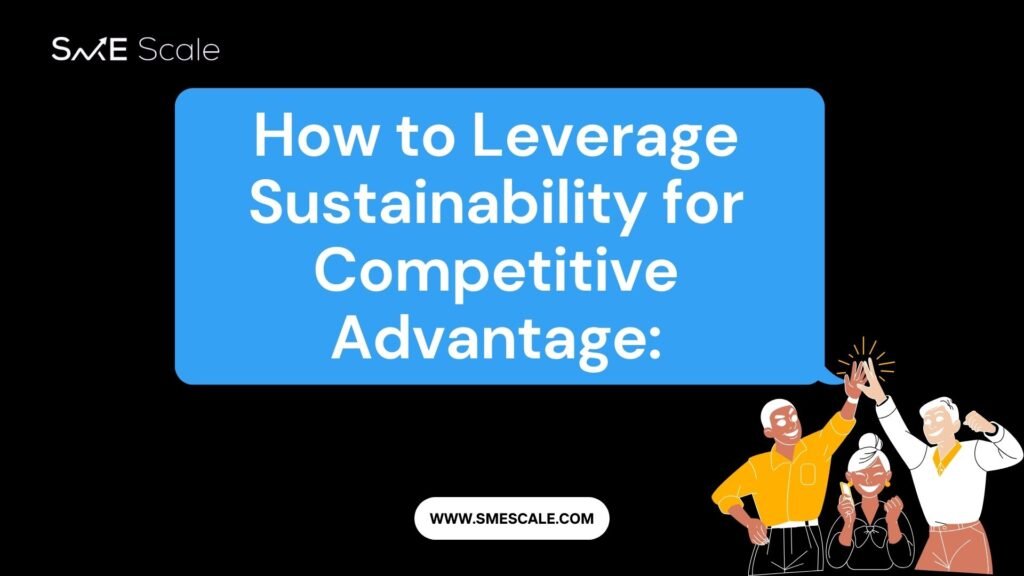How to Leverage Sustainability for Competitive Advantage: Insights for SMEs

Sustainability is no longer just a buzzword—it’s a powerful driver of competitive advantage for small and medium-sized enterprises (SMEs). As consumer demand for ethical and eco-friendly practices rises, SMEs that embrace sustainability not only stand out in the market but also build lasting trust with their audience.
In this blog, we’ll explore how sustainability can become a competitive edge, supported by a real-life case study showcasing effective marketing strategies. We’ll also delve into the psychological principles behind consumer preferences for sustainable brands and provide actionable insights for SMEs to implement today.
Why Sustainability Matters in 2024
The 2024 business landscape is defined by consumer awareness and responsibility. Studies show that 73% of consumers prefer to purchase from brands that align with their values. This shift has made sustainability a priority, not just for large corporations but also for SMEs looking to thrive in competitive markets.
SME Scale, a consultancy specializing in growth solutions, highlights the importance of aligning business strategies with sustainability goals. From sustainable product packaging to ethical sourcing, SMEs have numerous opportunities to weave sustainability into their operations and marketing.
The Psychology of Sustainability
Understanding the psychology behind consumer behavior is key to leveraging sustainability for competitive advantage. Three psychological principles stand out:
Moral Alignment
Consumers are drawn to brands that reflect their personal values. Purchasing from a sustainable brand allows individuals to feel they are contributing positively to environmental and social causes.
Trust and Authenticity
Transparency in sustainability efforts fosters trust. When SMEs share their journey—challenges, progress, and goals—they appear more authentic, which strengthens customer loyalty.
Social Proof
Highlighting customer reviews, partnerships, or certifications related to sustainability reinforces a brand’s commitment and motivates others to support the business.
Key Strategies to Leverage Sustainability
Here are actionable strategies SMEs can adopt to build a competitive edge:
Communicate Your Sustainability Story
Use storytelling to share your sustainability journey. For instance, create blog posts, videos, or social media campaigns that highlight how your brand is making a difference.
Offer Eco-Friendly Products or Services
Incorporate sustainable materials, energy-efficient processes, or ethical sourcing into your offerings. Clearly label these features in your marketing materials.
Partner with Like-Minded Organizations
Collaborate with eco-conscious brands or non-profits to strengthen your credibility and expand your reach.
Highlight Sustainable Practices on Your Website
Use tools like SME Scale’s website development services to showcase your sustainability initiatives, from carbon footprint reduction to waste management practices.
Leverage Certifications and Labels
Earn recognized certifications like Fair Trade or Carbon Neutral. Display these on your products and website to build trust and appeal to environmentally-conscious consumers.
Case Study: Bloom & Thrive
Background:
Bloom & Thrive, a small business specializing in handmade home decor, faced stiff competition in the saturated e-commerce market. To differentiate themselves, they decided to integrate sustainability into their brand strategy.
Solution:
With the guidance of SME Scale, Bloom & Thrive implemented a three-pronged sustainability plan:
Eco-Friendly Products: They switched to sustainably sourced wood and organic paints for their products.
Transparent Practices: They documented their supply chain and shared updates with customers through blogs and social media.
Green Packaging: They adopted compostable packaging and incentivized customers to recycle by offering discounts on future purchases.
Marketing Execution:
Bloom & Thrive used SME Scale’s AI-powered insights to identify eco-conscious customer segments.
They launched a storytelling campaign called “Behind the Craft,” featuring artisans sharing how sustainability inspires their work.
Influencers in the sustainability niche were brought on board to showcase the brand’s commitment to eco-friendliness.
Results:
Sales increased by 50% within six months.
Social media engagement grew by 40%, with customers sharing unboxing experiences featuring sustainable packaging.
The brand earned the “Green Business of the Year” award, boosting credibility and visibility.
Key Takeaway:
Bloom & Thrive’s success underscores how SMEs can use sustainability not just as a value-add but as a differentiator that drives growth.
How SME Scale Can Help
Leveraging sustainability for competitive advantage requires strategic planning and execution. SME Scale offers services tailored to SMEs, including:
Website & Funnel Development: Showcase your sustainability story with high-conversion websites.
Content Creation: Develop engaging blogs, videos, and social media posts that emphasize your eco-friendly practices.
AI-Powered Insights: Identify and target the right customer segments for your sustainable offerings.
Process Optimization: Streamline operations with eco-conscious strategies to reduce waste and increase efficiency.
By partnering with SME Scale, SMEs can position themselves as leaders in sustainability while achieving measurable growth.
Conclusion
Sustainability is more than a trend—it’s a business imperative in 2024. SMEs that adopt eco-friendly practices and effectively communicate their efforts can build trust, attract loyal customers, and gain a competitive edge.
The case of Bloom & Thrive demonstrates the tangible benefits of integrating sustainability into business strategy. By leveraging tools like AI insights, storytelling, and partnerships, SMEs can unlock growth while making a positive impact on the planet.
Ready to scale sustainably? Visit SME Scale to learn how their tailored services can help your business thrive in today’s eco-conscious market.

